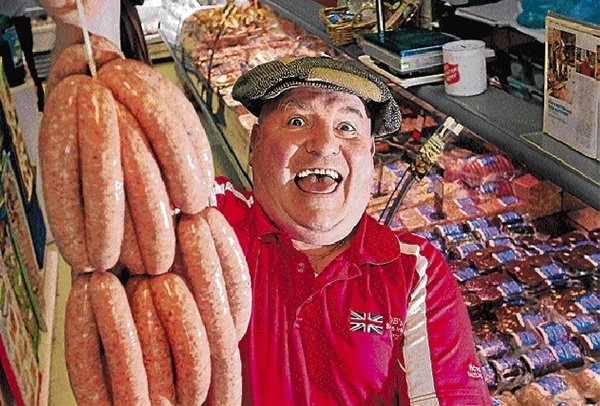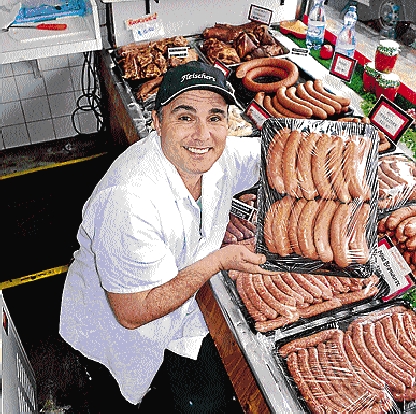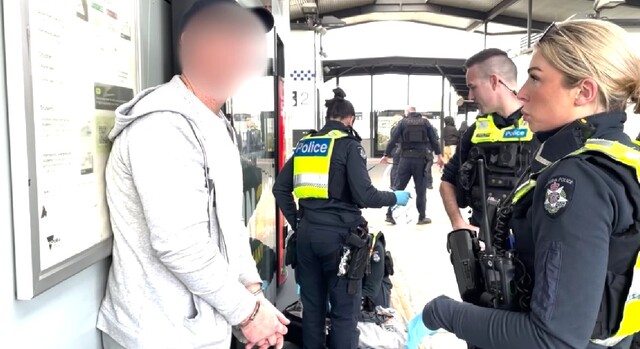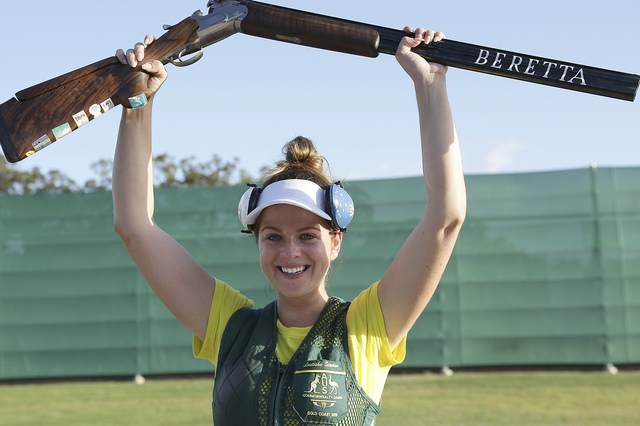By Claire Thwaites
Everyone has their favourite local butcher – they are there for advice and known for service with a smile.
It’s a dirty job that requires countless hours and a huge commitment but, with 1100 shops in Victoria alone, the humble butcher doesn’t seem to be going anywhere any time soon.
Rob Boyle of Rob’s British Butchers in Dandenong has been in the industry for more than 40 years and, although the 70-hour weeks can wear him out, his passion for the job remains. He saw a dip in sales during the 1980s and ’90s followed by a resurgence in the past decade.
After operating in Dandenong for 20 years Mr Boyle says he has built up an extremely loyal customer base.
To stay ahead of the game – particularly to beat the supermarket big boys – he says you must give customers something the supermarkets don’t have: “better quality and better service”.
“I think we’ve already won the battle against the supermarkets,” he says. “People like being able to talk to the butcher and ask advice. I don’t think the supermarkets will ever beat the butchers the way it’s happened in some other countries.”
He does concede that some changes have had to be made in the way businesses are run. “We’ve had to get more creative to survive. You’re having to work harder to entice the customer with things like pre-cooked meals. You need a bit more imagination these days.”
Mr Boyle believes the massive popularity of TV cooking shows like Masterchef and My
Kitchen Rules has helped the industry and given people a greater sense of adventure when it comes to cooking at home.
Dean Collins, who runs Fleischer’s Continental Butchers in Boronia, agrees. “People are more aware of where their food comes from,” he says. “We had all our signage redone to promote the fact that all our goods are made here.”
Mr Collins caters for the Polish and German communities and has customers travel from as far as Mildura to sample his smallgoods. “The key to being a good butcher is to make sure everything is fresh.”
A typical work day for Mr Collins starts at 4.30am and finishes at 6pm. The hours, he says, are the hardest thing about being in the industry. The second? The threat of big supermarkets.
“You’d be a liar if you said the competition didn’t affect you. They are doing their best to make everything a one-stop shop and they’ll do anything to stop the little guy.”
He agrees that diversification of products is a key to survival, as is building up a strong client base with locals. “That’s why we’ve such a strong established business – we’ve been in the area for so long.”
The Australian Meat Industry Council’s Victorian manager Mark Hardy says a number of places in Melbourne’s outer east are growth areas for butcher shops and identified Cranbourne and Pakenham as areas of interest for new butcher shops.
What do you think? Scroll to below this story to post a comment, or at facebook.com/greaterdandenongweekly or or use Twitter @DandenongWeekly
“Areas that were once considered regional but have seen an influx of people are growth areas for butchers. We are moving away from the high street shop and more into shopping centre models.”
He agreed with Mr Boyle about the 1980s and ’90s being a time when a lot of butcher shops were closing down.
“This was due to people changing their shopping habits and also we were going through an evolution of the trade itself. We were changing from the traditional butcher into what we have now where consumers are looking for more pre-prepared products, marinades and so on.”
The number of independent butcher shops is remaining stable at about 3200 to 3500 nationally, Mr Hardy says.
“We once again are into the next evolution of butcher shops. Nowadays, a butcher has to become a business man first, a retailer second and a butcher third. It’s one of the unique trades like hairdressing: you have a skill and a shop-front and you have to manage both things.”
He says that Rob Boyle and Dean Collins are right in diversification being a key but also insists that good marketing is critical. “It’s time for butchers to become hunters, not the hunted. I think the perceived convenience of shopping at a supermarket is one hurdle we have to get over.”
He thinks ideas like creating databases for customers and sending out meals plans, plus online orders, are all where the future of shopping at butchers is heading.
Mr Hardy believes the popularity of farmers’ markets and the understanding of food sustainability has also been beneficial to butchers, as people are more conscious of the distance from paddock to plate.
Mr Hardy does not predict a huge growth in the number of outlets but is confident of an increase in market share. “I think we’ll remain with a 25 to 35 per cent share of the market in the future. Purely because of the dominance of the chain supermarkets I can’t see huge growth, but it’s definitely going to remain stable.
“People are looking at what they are eating and what will keep them healthy – no one can afford to get sick these days. People are also eating at home a lot more to save money.”
Mr Hardy also credits shows like Masterchef for keeping people cooking at home and enjoying entertaining. “I think we have got to give these shows some credit; they are putting food back on the table.
”People like going to their butcher to discuss things and get advice. It’s also helped introduce people to secondary cuts of meat like chuck steak and allowed them to explore more when cooking.”
Trends in restaurants also have an impact on what butchers are selling – Mr Hardy says lamb shanks and belly pork are now big sellers. “Up until about two years ago, butchers were probably throwing half of their belly pork out but restaurants and TV shows keep showing slow-roasted belly pork and now it’s a huge seller. It all has a cycle.”
Mr Boyle is in on the trend too: “My wife does a mean roasted pork belly!”








